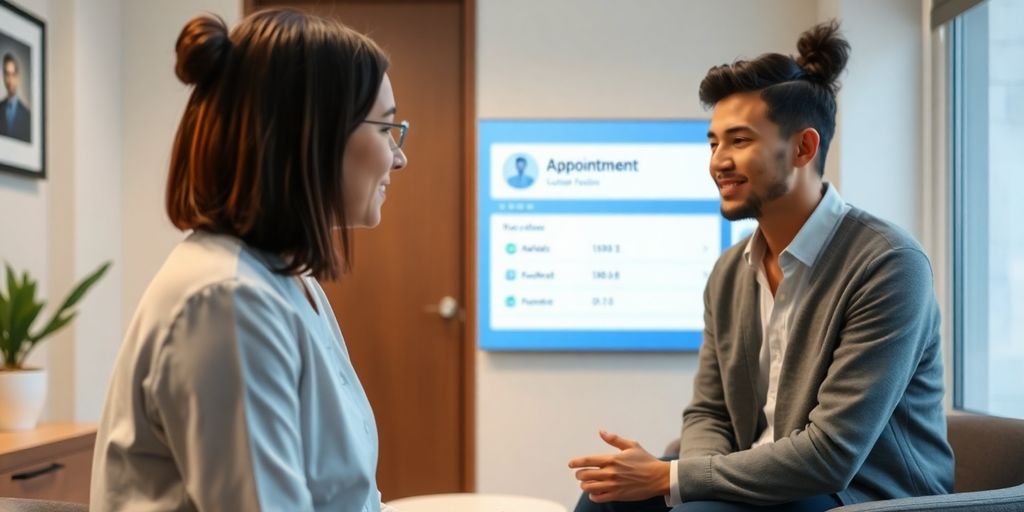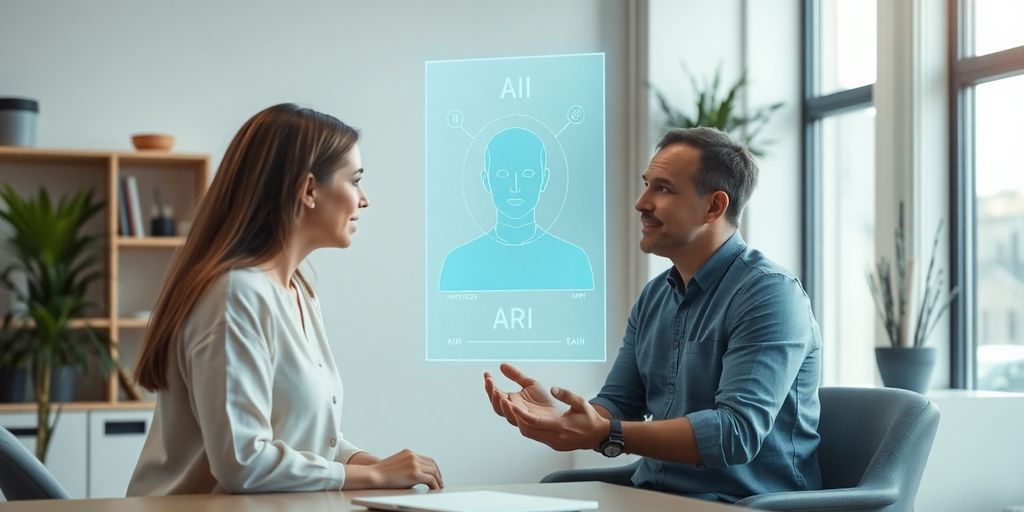Many mental health therapists are looking for ways to make their practices run smoother. It's a lot to handle, right? Between seeing clients, managing paperwork, and just keeping the lights on, the front desk can get pretty hectic. That's where the idea of an AI receptionist for mental health therapists comes in. It’s like having an extra pair of hands, but digital, that can take care of a bunch of those time-consuming tasks. Let's break down what this means for your practice.

Running a mental health practice involves a lot of moving parts, and the front desk is often the busiest hub. Think about all the calls, appointment setting, and client questions that come in daily. An AI receptionist can really help sort this all out.
This technology takes over many of the routine jobs that usually tie up a human receptionist. Things like answering common questions, booking new client appointments, and even sending out appointment reminders can all be handled automatically. This means fewer dropped calls and less time spent on repetitive tasks. It's about making sure the basic operations run smoothly so the focus can stay on patient care. For example, an AI receptionist can help streamline dental clinic operations by managing appointment scheduling and sending reminders, freeing up staff time.
Clients today expect quick responses, and an AI receptionist can provide that. It's available 24/7, so clients can get information or book appointments whenever it's convenient for them, not just during office hours. This constant availability can make a big difference in how clients feel about your practice. It also means that when clients do reach out, they're more likely to get a helpful response right away, which is key for enhancing salon productivity and client satisfaction.
For therapists, the administrative load can be significant. An AI receptionist can take a large chunk of that off your plate. By automating tasks like intake form collection or answering frequently asked questions about services, therapists and their staff can spend more time on what matters most: providing therapy. This shift helps reduce burnout and allows for a more focused approach to patient well-being, much like how AI can help the legal profession prioritize mental well-being by handling administrative tasks.
Think about it: clients often reach out when they're in distress or have urgent questions. An AI receptionist means your practice is always available, 24/7. No more missed calls because it's after hours or everyone's on another line. This constant availability significantly cuts down on client frustration and the dreaded busy signal. Studies have shown that practices using AI receptionists see a noticeable jump in client satisfaction, largely due to shorter wait times and the simple fact that someone, or something, is always there to help. It's like having a dedicated front desk that never sleeps, which is a pretty big deal when you're trying to build trust and provide consistent support.
Let's talk numbers. Hiring and maintaining a human reception staff comes with a hefty price tag – salaries, benefits, office space, training, and more. An AI receptionist can handle a huge chunk of those front-office tasks for a fraction of the cost. Instead of paying for full-time staff, you're investing in a technology that scales with your practice. This means you can manage your budget more effectively, reallocating funds towards clinical resources or professional development. For many practices, the savings are substantial, often allowing them to operate more leanly without sacrificing service quality. It's a smart way to manage overhead while still providing excellent client care.
Human error is, well, human. Mistakes happen, especially when juggling multiple calendars, client requests, and administrative duties. AI receptionists, on the other hand, are programmed for precision. They can access your real-time availability, cross-reference it with client preferences, and book appointments with remarkable accuracy. This reduces the likelihood of double bookings or scheduling conflicts that can disrupt your workflow and annoy clients. By automating the scheduling process with a reliable system, you can spend less time correcting errors and more time focusing on your clients' therapeutic needs. This accuracy also extends to sending out reminders and managing cancellations, keeping your schedule organized and your clients informed. For practices looking to streamline operations, accurate scheduling is a major win.
Think of Zapier as the glue that holds your digital life together. Our AI receptionist isn't just a standalone tool; it's designed to play nicely with thousands of other applications you already use. With Zapier, your AI receptionist can connect to over 9,000 apps, turning it into the central hub for your practice's operations. This means when your AI receptionist handles a call, books an appointment, or takes a message, that information can automatically flow to your other tools. It’s like having a personal assistant who not only answers the phone but also updates your calendar, sends follow-up emails, and logs client interactions without you lifting a finger.
For mental health therapists, managing client information securely and efficiently is paramount. Our AI receptionist integrates directly with your existing Customer Relationship Management (CRM) and Electronic Medical Records (EMR) systems. This connection allows for real-time updates. For example, when a new client books an appointment through the AI, their details are instantly added to your CRM, and the appointment is logged in your EMR. This eliminates manual data entry, reduces the chance of errors, and keeps all your client information consistent and up-to-date across all platforms.
It's not just about sending information out; it's about getting it back too. The two-way data flow capability means your AI receptionist can not only send information to your other apps but also receive information from them. Imagine your AI receptionist checking your calendar to confirm availability before booking an appointment, or pulling client history from your EMR to personalize a follow-up message. This constant, automated exchange of data streamlines workflows, provides a more complete picture of client interactions, and frees up your time to focus on what matters most: your clients.

Remember those old phone systems where you'd get that dreaded busy signal? It felt like hitting a brick wall, right? Well, that's ancient history now. Our AI receptionist is built to handle an unlimited number of calls all at the same time. Seriously, it doesn't matter if your practice is suddenly swamped with inquiries; the AI just keeps going. It's like having a receptionist who never sleeps, never takes a break, and can somehow be in ten places at once. This means no more missed calls, no more frustrated clients waiting on hold forever, and definitely no more busy signals. Your practice can scale up or down without worrying about your phone system keeping up. Think about those crazy busy days, like after a big event or during a crisis – your AI receptionist stays consistent, handling everything smoothly. It's a game-changer for keeping clients happy and ensuring your practice always sounds professional and available, no matter the demand. It's the kind of reliability that lets you focus on what you do best: helping your clients.
Have you ever noticed how a slight delay in conversation can throw everything off? It's like trying to have a dance-off with someone who keeps tripping over their own feet. Our AI receptionist is different. It responds in milliseconds, which is so fast it feels like you're talking to a real person. This speed is key to making conversations feel natural and not robotic. It means the AI can keep up with the flow of dialogue, understand what's being said, and reply without awkward pauses. This isn't just about being quick; it's about creating a smooth, engaging experience for everyone who calls in. It makes a huge difference in how clients perceive your practice – they feel heard and understood right away.
Latency, that little bit of lag in communication, can really mess things up. It makes conversations feel clunky and unnatural. We've worked hard to get rid of that. Our AI receptionist is designed to have virtually no delay. When a client speaks, the AI processes it and responds almost instantly. This means interactions are fluid, like a normal chat. It helps build rapport and trust because the client doesn't have to wait for the AI to
As your mental health practice grows, the administrative tasks can quickly become overwhelming. You might start with just a few clients, but before you know it, you're juggling appointment scheduling, client inquiries, billing questions, and more. This is where an AI receptionist really shines, offering a way to handle increased volume without breaking a sweat. It's designed to grow with you, no matter how big or small your practice is.
Think about it: when your practice gets busier, you don't want to be stuck with a busy signal or long hold times. An AI receptionist can manage an unlimited number of calls simultaneously. This means that even during your busiest periods, like after a successful marketing campaign or during a common cold season, every client gets through. It's like having a front desk staff that never sleeps and can clone itself infinitely.
This is a game-changer for practices experiencing rapid growth or seasonal peaks. Instead of worrying about phone line capacity or hiring more staff just for call volume, the AI handles it all. It can manage thousands of calls at the same time, ensuring no client is ever left waiting or gets a busy signal. This means your practice can scale up without the usual growing pains associated with increased communication demands.
When your practice is booming, consistency in client experience is key. An AI receptionist provides that. It answers every call with the same level of professionalism and accuracy, regardless of how many calls are coming in. This consistency builds trust and reinforces your practice's reputation, even when you're handling a surge in client interactions. It’s like having a perfectly trained receptionist available 24/7, always ready to assist.
Remember the frustration of calling a business and hearing that dreaded busy signal? With an AI receptionist, that's a thing of the past. It eliminates the concept of a busy signal entirely. Every call is answered, every client is heard, and every opportunity is captured. This not only improves client satisfaction but also ensures you're not missing out on potential new clients or important communications from existing ones. It’s a simple yet powerful way to keep your practice accessible and responsive.
Think of your AI receptionist as a tool you can fine-tune to fit your practice's rhythm perfectly. It's not about letting technology run wild; it's about giving you the reins to manage how and when it works. This means you can set clear boundaries, making sure the AI supports your practice without taking over.
You can put a cap on how many minutes the AI receptionist is active. This is great for managing costs and making sure the AI is available when you need it most. For example, you could set a limit of 500 minutes per month. If your practice is small, this might be more than enough. For larger practices, you might need to adjust this number. It’s all about finding that sweet spot for your budget and client needs. You can easily track usage and get alerts when you're getting close to your limit, so there are no surprises.
This is where you tell the AI exactly when to be on duty. You can program it to work only during your official business hours, or perhaps extend its availability slightly into the evenings or weekends. It’s smart enough to know when to answer and when to let calls go to voicemail or forward them to a human. This means clients calling at 3 AM won't get an AI that's supposed to be off duty; they'll get the appropriate after-hours message. It respects your time and your clients' need for accurate information based on the time of day. This level of control helps maintain a professional image and avoids confusing clients about your availability. You can even set different schedules for holidays or special events, making sure your practice always presents a consistent front. This is a big step up from a simple answering machine, offering a much more dynamic and responsive experience for anyone trying to reach you. It’s like having a receptionist who knows your schedule better than you do, always ready to act appropriately. This feature is key for managing client communication effectively.
When your official business hours end, the AI doesn't just shut off. You can set up specific workflows for when the office is closed. This could include directing callers to leave a detailed voicemail, providing information about when the office will reopen, or even offering a link for clients to book an appointment online. For mental health practices, this is particularly useful. If a client is in distress outside of hours, the AI can be programmed to provide crisis hotline numbers or direct them to emergency resources. It’s about creating a safety net and a clear path for clients, even when human staff aren't available. This ensures that critical needs are addressed promptly and appropriately, maintaining a high standard of care. It’s a way to keep the practice running smoothly, even when you’re not physically there. This kind of automation is a core part of what makes an AI phone receptionist so powerful for small businesses.

When you're running a mental health practice, keeping client information safe and following all the rules is super important. It's not just about being ethical; it's about building trust and avoiding big problems. Think about it: people are sharing really personal stuff with you, and they need to know it's protected.
In the U.S., HIPAA is the big one. It sets strict rules for how Protected Health Information (PHI) is handled. Any AI receptionist you use needs to be fully compliant. This means it can only access the PHI it absolutely needs to do its job, like confirming an appointment or sending intake forms. And it can't just share that info around; data use has to be really limited. It’s a lot to keep track of, but it’s necessary for client confidentiality.
Beyond just HIPAA, you've got to think about how the AI actually uses the data. Does it only access what's needed for a specific task? Is there a clear record of who accessed what, and when? This kind of oversight helps prevent accidental data leaks or misuse. It’s about making sure the AI acts like a responsible member of your team, not a security risk. For mental health professionals, this level of care is non-negotiable.
All the information the AI stores, and any data exchanged during client conversations, needs to be locked down tight with strong encryption. This is your first line of defense against hacking and data breaches. Without it, you're basically leaving the door wide open. Reputable AI providers will use industry-standard security methods to keep everything safe. It’s a basic requirement for any AI front desk service you consider.
The goal is to create a system where the AI receptionist handles administrative tasks efficiently while upholding the highest standards of privacy and security, giving both you and your clients peace of mind.

When you bring an AI receptionist into a mental health practice, it's not like setting one up for a retail store. The language needs to be just right. We're talking about empathy, understanding, and a gentle approach. The AI needs to be trained on terms and phrases that are common in therapy sessions, like "How are you feeling today?" or "I'm here to listen." It's about making sure the AI sounds supportive and not robotic. This involves feeding it data that reflects the nuances of mental health conversations. The goal is to create an AI that feels like a helpful extension of the practice, not an outsider.
This is a big one. What happens if someone calls in distress? The AI needs to be programmed to recognize keywords or phrases that indicate a crisis. It shouldn't try to handle a serious situation itself, but it needs to know when to escalate. This means having clear protocols for transferring calls to a human, providing emergency contact information, or guiding the caller to immediate resources. It's about safety first. The AI should be able to offer basic comfort and then quickly connect the person to the right help. Think of it as a first responder that knows when to hand off to the professionals. We can help you customize your AI receptionist's behavior to manage these situations appropriately.
To really get this right, you can't just rely on tech people. Mental health professionals need to be involved from the start. Therapists and counselors can provide feedback on the AI's responses, help refine its language, and guide its decision-making process for sensitive calls. This collaboration ensures the AI aligns with ethical standards and the practical needs of a therapy setting. It's a team effort to make sure the AI is a true asset. This kind of input is vital for building trust and making sure the AI is genuinely helpful. It's how we make sure the AI is a good fit for your mental health practice.
When you bring an AI receptionist into a mental health practice, it's natural for both clients and staff to have questions or even some worries. People are used to talking to a human when they reach out for support, and the idea of an AI handling that first contact can feel a bit strange. It's important to be upfront about how the AI works and what its role is.
For clients, the main concerns often revolve around whether the AI will feel cold or impersonal. They might worry about privacy, too, even for administrative tasks. Explaining that the AI is there to help with things like scheduling and answering basic questions, freeing up human staff for more complex needs, can ease these worries. Transparency is key here; letting clients know that the AI follows strict privacy rules and is designed to be helpful, not intrusive, builds confidence. It’s also about making sure the AI is trained to be sensitive to the language used in mental health settings. For example, it should know when to simply take a message and when a situation might need immediate human attention.
Staff might feel anxious about their own roles or worry that the AI will replace them. It’s vital to communicate that the AI is a tool to support them, not replace them. Think of it as an assistant that handles the repetitive tasks, allowing therapists and administrative staff to focus on more meaningful interactions and patient care. Showing them how the AI can reduce their workload and improve efficiency can help them see its benefits. Regular training and feedback sessions involving both staff and mental health experts can also help tailor the AI's responses and build trust in its capabilities. It’s a balance – using AI for what it does best, and keeping the human touch where it matters most.
The world of AI receptionists is always moving forward. We're seeing some pretty interesting developments that will change how these tools work, especially for therapists.
AI is getting better at picking up on subtle cues in a person's voice. This means future AI receptionists might be able to notice changes in tone or word choice that could signal someone is in distress. The goal is for the AI to respond with more care and know when to flag a situation for human attention.
Imagine your AI receptionist being able to connect with health trackers or other wearable devices. This could allow for more informed appointment scheduling or follow-ups, based on a client's reported well-being. It's about making the AI more aware of the client's overall health picture.
We've all experienced those clunky, robotic conversations with automated systems. The next big step is making AI dialogue much more natural. Think about AI that can understand slang, pauses, and even interruptions without getting confused. This will make interactions feel less like talking to a machine and more like talking to a helpful assistant. This focus on natural conversation is key to reducing client frustration.
The world of AI receptionists is always changing. Soon, these smart assistants will do even more to help businesses. Imagine them handling complex tasks and understanding conversations better than ever. Want to see how our AI receptionist can help your business today? Visit our website to learn more and get started!
So, we've looked at how AI receptionists can really change things for mental health therapists. They can handle calls, book appointments, and manage a lot of the day-to-day stuff that takes up so much time. This means therapists can spend more time actually helping people, which is what they got into this field to do. While there are things to think about, like making sure the AI is trained right and keeps client information safe, the benefits seem pretty clear. It's not about replacing the human touch, but about making the whole process smoother and more efficient for everyone involved. Getting on board with this tech now could really set a practice up for success down the road.
An AI receptionist is like a smart virtual assistant for your office. It can answer phones, book appointments, and answer common questions, just like a human receptionist, but it works all day and night without getting tired. This helps your practice by taking care of the small tasks so you can focus more on helping your clients.
Using an AI receptionist can really help your practice run smoother. It takes care of things like answering calls, scheduling appointments, sending reminders, and managing basic client questions. This means less paperwork and fewer interruptions for you and your staff, freeing up time to focus on patient care.
AI receptionists are always available, 24/7. This means clients can call anytime, even after office hours or on holidays, and still get help. This is great for clients who might be feeling anxious or need to reach out quickly, and it reduces the chance of missed calls or clients not getting help when they need it.
Yes, AI receptionists can connect with many other apps and systems you might already use, like your calendar or client records software. This connection helps keep all your information in one place and makes sure everything works together smoothly, like a well-oiled machine.
Security and privacy are super important, especially in therapy. Good AI receptionist systems are built to follow strict rules like HIPAA, which protects sensitive client information. They use strong security measures to keep data safe and private, just like you'd expect for important medical information.
AI receptionists are very fast, responding in just milliseconds. This means they can have natural-sounding conversations without awkward pauses. This quickness helps make sure clients feel heard and understood, making their experience much better.
You can set limits on how much the AI receptionist is used, like controlling how many minutes it's active each day or week. You can also tell it when to work, like only during your office hours or specific times, making sure it fits your practice's needs and budget.
The AI is trained to understand the special language used in therapy and how to handle sensitive topics or crises with care. Mental health experts are often involved in making sure the AI responds appropriately and kindly, so it supports, rather than replaces, the human touch clients need.
Start your free trial for My AI Front Desk today, it takes minutes to setup!








